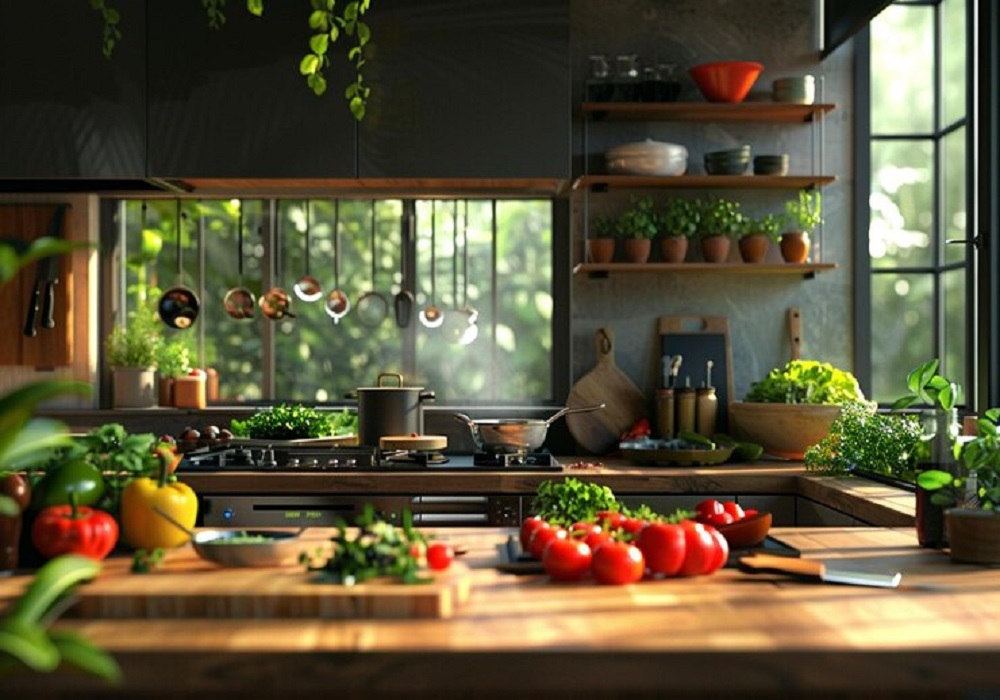Indoor Plants for Kitchen Garden in India: Bringing Green Indoors
Indoor plants have found their way into our homes not just as decorative pieces but as essential elements that contribute to our well-being. The kitchen, often considered the heart of the home, is an ideal place to cultivate a small garden. In India, where space can be a constraint, indoor kitchen gardens offer a perfect solution to bring green indoors and enjoy fresh produce. Plants for kitchen garden in India can transform your living space into a thriving green oasis. Let’s dive into the essentials of creating a thriving indoor kitchen garden in India.
Choosing the Right Plants For Kitchen Garden in India
Factors to Consider
When selecting plants for your indoor kitchen garden, consider factors such as available space, light conditions, and the local climate. Plants that require minimal care and adapt well to indoor environments are ideal.
Climate Suitability
India’s diverse climate means you need to choose plants that can thrive indoors year-round. Opt for species that can withstand varying temperatures and humidity levels typically found in Indian homes.
Best Indoor Plants for Kitchen Gardens in India
Herbs
Basil
Basil is a versatile herb that is a staple in many Indian dishes. It’s easy to grow indoors and requires minimal maintenance. Ensure it gets plenty of sunlight, and it will reward you with lush green leaves.
Mint
Mint is perfect for refreshing drinks and culinary dishes. It grows quickly and can be harvested frequently. Keep it in a pot with good drainage and in a spot where it gets some sunlight.
Coriander
Coriander, or cilantro, is another must-have herb in the kitchen. It grows well in small pots and requires moderate sunlight. Regularly trim the leaves to encourage bushier growth.
Vegetables
Cherry Tomatoes
Cherry tomatoes are
a fantastic addition to any indoor kitchen garden. They thrive in containers and can produce a substantial yield with proper care. Place them near a sunny window, and support their growth with stakes or a small trellis.
Green Chillies
Green chillies are essential in many Indian recipes. These plants are relatively easy to grow indoors and require plenty of sunlight. Ensure the soil remains moist but not waterlogged.
Spinach
Spinach is a nutritious leafy green that grows well in cooler indoor environments. It doesn’t require as much sunlight as other vegetables, making it perfect for a kitchen setting.
Fruits
Lemons
Dwarf lemon trees can be grown indoors in large pots. They need a lot of sunlight, so placing them near a south-facing window is ideal. With proper care, these trees can produce fruit year-round.
Strawberries
Strawberries can be grown in hanging baskets or small pots. They require moderate sunlight and consistent watering. Indoor strawberry plants can provide a delightful treat with minimal effort.
Care Tips for Kitchen Garden Plants
Watering Requirements
Each plant has different watering needs. Herbs like basil and mint need regular watering, while succulents and cacti require less frequent watering. Ensure that the soil is well-drained to prevent root rot.
Light Conditions
Most kitchen garden plants need plenty of light. Position your plants near windows where they can receive at least 4-6 hours of sunlight daily. For plants that require less light, place them in spots with indirect sunlight.
Soil and Fertilization
For your plants for kitchen garden in India, make sure to use a high-quality potting mix that provides adequate nutrients and drainage. Fertilize your plants every few weeks with organic compost or a balanced liquid fertilizer to ensure healthy growth.
Setting Up Your Indoor Kitchen Garden
Choosing the Right Containers
Select containers that are appropriate for the plant size and have good drainage. Clay pots, plastic containers, and hanging baskets are all excellent options.
Arranging Plants for Optimal Growth
Arrange your plants according to their light and space needs. Taller plants should be placed in the back or in corners, while smaller plants can be positioned at the front or on windowsills.
Utilizing Vertical Space
Use vertical space efficiently by installing shelves, hanging planters, or wall-mounted containers. This maximizes space and creates an attractive display.
Dealing with Common Problems
Pests and Diseases
Common indoor plant pests include aphids, spider mites, and whiteflies. Use natural insecticides like neem oil or introduce beneficial insects like ladybugs to control these pests.
Overwatering and Underwatering
Monitor your plants regularly to avoid overwatering or underwatering. Stick your finger into the soil up to the second knuckle to check moisture levels. Adjust watering habits accordingly.
Nutrient Deficiencies
Signs of nutrient deficiencies include yellowing leaves, stunted growth, and poor yield. Use a balanced fertilizer and ensure your plants are getting adequate light and water to prevent deficiencies.
Creative Ideas for Kitchen Garden Layouts
Windowsill Gardens
Utilize your windowsills to grow small herbs and plants. This space is ideal for plants that need plenty of sunlight.
Hanging Planters
Hanging planters are great for growing trailing plants like strawberries and mint. They save counter space and add a decorative element to your kitchen.
Countertop Arrangements
Keep frequently used herbs in small pots on your kitchen countertop. This makes them easily accessible for cooking and adds a touch of greenery to your kitchen.
Benefits of Indoor Kitchen Gardens
Health Benefits
Indoor plants enhance air quality by filtering out pollutants and increasing oxygen levels. Additionally, having fresh herbs and vegetables readily available in your kitchen offers a healthy boost to your diet.
Environmental Impact
Growing your own produce reduces the carbon footprint associated with transporting store-bought vegetables. It also promotes sustainable living practices.
Culinary Advantages
Having fresh herbs and vegetables at your fingertips enhances the flavor of your dishes. It encourages creativity in the kitchen and allows for healthier meal preparation.
Conclusion
Creating an indoor kitchen garden in India is a rewarding endeavor that brings numerous benefits. From enhancing your culinary experiences to promoting a healthier environment, the advantages are endless. With the right plants and care, your kitchen can become a green oasis that provides fresh produce year-round. Start your kitchen garden today and enjoy the many joys of indoor gardening.






